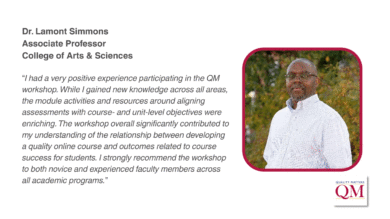
Announcements
Quality Learning Starts with Quality Matters

Congratulations to all the finishers of the
QM Rubrics Workshop (November – April)!
Interested in becoming a Certified Online/Hybrid Course Builder at UDC? The QM Rubrics workshop is a crucial step. CAL encourages ALL faculty to register and enhance their understanding of Quality Matters (QM)— click here for more details. CAL will sponsor the fees for QM certification. Check the list of QM Rubric-certified faculty at UDC.
For registration and questions, please email Julian King at Julian.king@udc.edu.
Artificial Intelligence (AI) Ethics in Accounting

Brandon Schweitzer, Ph.D.
Assistant Professor of Accounting, UDC-CC
Dr. Schweitzer has published a research paper titled “Artificial Intelligence (AI) Ethics in Accounting.” In the paper, he discusses the dual-edged impact of AI in accounting—its potential to revolutionize efficiency and accuracy versus ethical dilemmas like privacy breaches and bias. The article calls for a responsible AI framework emphasizing “clear ethical guidelines, data privacy, bias mitigation, and transparency.” It highlights the accountant’s role in navigating these challenges, stressing the importance of ethical integrity and public trust in the era of AI. Click here to read the full paper.
Please join Dr. Schweitzer in a webinar on AI Ethics in Accounting Education.
Tuesday, April 23rd at 12:00 – 3:00 p.m. | CLICK HERE to register
Summer 2024 Ultra Courses are now on Blackboard!
Summer 2024 Ultra courses have been loaded on Blackboard. Courses will be available to students on April 15th. If your course content is not ready, you can make items unavailable—CLICK HERE for instructions.
If you haven’t registered for Ultra training, CLICK HERE.
If you have any questions, please use the Consultation Request Form.
Thank you to those who took a moment to provide us with feedback to improve our service.
Click here to read the report. Special thanks to Dr. Rebecca Graham for assisting CAL in establishing data-driven approaches.
.
Professional Development Offerings
Data Visualization: EAC Basics
with Grace Kent, Instructional Designer & Outcomes Coordinator, CAL
Tuesday, April 30th at 12:00 – 1:00 p.m. | CLICK HERE to register
Harnessing the Power of Ai in Higher Education
Middle States Commission on Higher Education (MSCHE)
Tuesday, May 14th at 1:00 pm – 2:30 p.m. | CLICK HERE to register
Past Issues
Location | Bldg. 4250 Connecticut Avenue (Bldg 71) 6F
Email | calhelpdesk@udc.edu
Walk-in / Virtual Office Hours Click here
Faculty Spotlight
Julian King, M.Ed., CAL
Promotion to
Instructional Designer & Quality Matters Manager

In May 2020, during the challenging times of the pandemic, Julian joined CAL as an Instructional Consultant. At a critical juncture when CAL was facing the loss of most of its team, Julian stepped in. Fatma Elshobokshy recalls, “It was hectic and critical; every corner of UDC needed support in transitioning to the virtual environment. Julian’s pivotal role significantly advanced UDC’s tech adaptation.” Despite the overwhelming circumstances, Julian’s aptitude, demeanor, and high sense of responsibility made him an essential member of the Center and UDC within just two months of joining. His quick mastery of Blackboard 9.1 and later Ultra, along with his ability to support faculty, earned him rapid respect within the faculty community. Ms. Elshobokshy added, “Mr. King is one of the unsung heroes of the Ultra project. He not only learned the system but also excelled in the Ultra Gradebook, which is when the ‘Gradebook Wiz’ was coined.”
EdTech Corner
Learning with AI
Leveraging ChatGPT for Improved
Essay Brainstorming

Dr. Craig Wynne revolutionized essay brainstorming in his course IGED111 – Foundation Writing II by incorporating ChatGPT. This innovative approach was applied to the essay assignment titled “Are Declining Marriage Rates A Good Thing, Bad Thing, or Somewhere In Between?” Through ChatGPT, students were able to explore a multitude of perspectives. Dr. Wynne stated, “I believe this technology enhances students’ writing skills.” He further noted, “Students were able to gather various perspectives on the issue, which led to more balanced arguments.” As a result, Dr. Wynne observed, “The essays were well-rounded and insightful, reflecting a deep understanding of the complexities surrounding declining marriage rates.” This method improved the quality of arguments, enhanced critical thinking and empathy, and taught students to integrate diverse viewpoints, preparing them for future academic pursuits and real-world challenges.
Click here to check the Assignment instructions.




